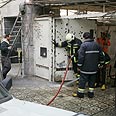
US rejects Iran accusations in scientist's death
State Department official says Tehran's accusations US had role in Mohammadi's death 'absurd'; opposition sources say regime feared he was seeking political asylum in Sweden
A US official on Tuesday rejected as "absurd" Iranian accusations that the United States had a role in the killing of a Tehran University nuclear scientist.
The scientist, Massoud Ali-Mohammadi, was killed by a remote-controlled bomb, according to Iranian state media. Iran blamed the attack on the United States and Israel.
"Charges of US involvement are absurd," said a US State Department official, who spoke on condition of anonymity.
Sources in Iran's opposition said the regime in Tehran wanted Mohammadi dead after learning of his plan to seek political asylum in Sweden. The regime feared he would reveal information on Iran's nuclear program, the opposition sources claimed.
A number of Iranian scientists involved in Iran's nuclear program have fled the country in recent years. A British daily reported last month that one of the scientists, Sharam Amiri, who disappeared after arriving in Saudi Arabia for a pilgrimage in late May and defected to the US, provided vital information on Tehran's nuclear program.
Over the past two weeks five retired Iranian diplomats have requested political asylum in Europe.
'Corruption on earth'
According to reports coming in from the opposition in Iran and exiled opposition leaders, Mohammadi's associates said he had recently been in touch with Stockholm University regarding a one-year research grant.
Mohammadi ended his collaboration with Iran's atomic energy organization some four months ago.
According to bloggers affiliated with Iran's opposition movement, Mohammadi supported reformist leader Mir Hossein Mousavi in the controversial June 12 elections, despite the regime's claim that he was "a revolutionist loyal to the Islamic Republic."
Also on Tuesday, seven members of Iran's Baha'i minority went on trial, accused of spying and acting against the country's national security.
The state TV Web site said the Baha'is have also been charged with cooperating with archenemy Israel and gathering classified documents. They were arrested in 2008.
The charges against them also include "corruption on earth", an Islamic term for crimes punishable with the death sentence in Iran.
State IRNA news agency said the first hearing was held Tuesday and that the trial would continue.
The Islamic minority are followers of a faith founded in 19th century. It has been illegal since the 1979, when Islamic clerics came to power in Iran.
Reuters and AP contributed to the report










